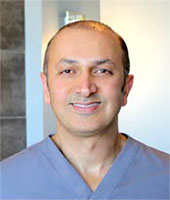You may realize that you can’t go long without replacing lost teeth before the others naturally lean towards that gap and your entire arch gets misaligned, causing other teeth to become loose. You probably know that dental implants are the best solution, lasting much longer than dental bridges and dentures, enabling you to chew and speak as if you had all your natural teeth.
If you hesitate because you are concerned about the pain of having an implant inserted into the tooth socket, you needn’t be. Even if you need a bone graft to build up the area of the jawbone where an implant will be placed, you have a variety of options to be sure you only feel some normal discomfort.
An implant starts with a biocompatible metal screw being inserted into the empty tooth socket and then is allowed to heal for a few months (when a customized dental crown that looks like the original tooth will be attached).
Before an initial implant procedure is done, a topical numbing solution is first swabbed on the area before an injection of anesthesia is administered (which only feels like a pin prick). If you want to minimize anxiety, mild oral sedation (benzodiazepine) is available in pill form. A stronger version will cause you to feel drowsy or even sleep through surgery. Many prefer to have an intravenous (IV) drip, which will put you in a deep state of relaxation, yet you will remain conscious (though you may not recall much in the way of detail and be surprised when it is done).
Many patients find that ibuprofen or acetaminophen are adequate for pain control 4-6 hours afterwards, when the sedation wears off, but you will always be given a prescription for medication in case it is needed.
It is important to maintain good oral hygiene afterwards to avoid infection. For the first few days, avoid chewing and eat only soft or pureed foods. You should brush softly around the implant, normally everywhere else, and use salt water rinses to keep the area clean for 24 hours.
The success of having a dental implant depends in large part on the experience of the dentist and Dr. Louie is one of the most highly-regarded specialists in the Los Angeles area. The complexity of your individual case and your overall oral health are other factors.
Remember that not having a tooth replaced as soon as possible can lead to much more pain, as periodontal disease spreads, due to the misalignment, and other teeth are lost. Properly done and with good long-term oral care, dental implants can be a permanent and painless solution.
Read More About Cosmetic and General Dentistry Below:









